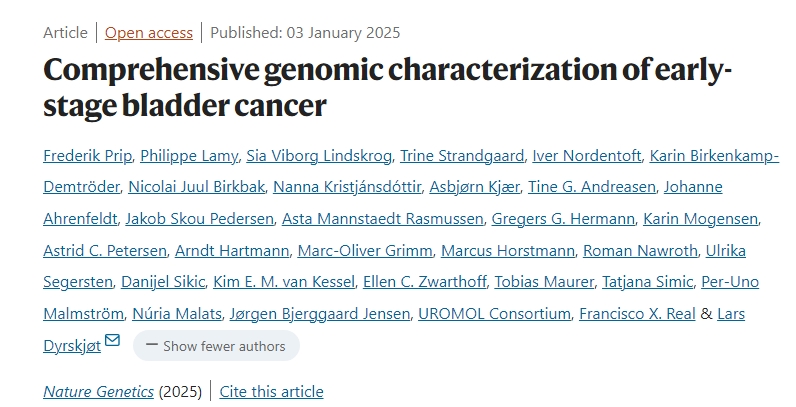Niklas Klümper, Senior Urology Consultant at the University Medical Center Bonn, reshared a post on X by Lars Dyrskjøt, Professor at Aarhus University, adding:
“Fantastic study on the genomic landscape of NMIBC in Nature Genetics and Nature.
A huge effort led by Lars Dyrskjøt.
Congrats Lars Dyrskjøt.
Really important data to develop rational targeted therapies for high-risk NMIBC.
Certainly the most comprehensive dataset in that setting.”
Quoting Lars Dyrskjøt’s post:
“I am excited to share our latest publication in Nature Genetics, marking a significant milestone in the UROMOL project—a 15+ year collaborative effort to characterize the biology of early-stage bladder cancer.
We performed a comprehensive genomic analysis of 438 tumors, utilizing whole-exome sequencing, shallow whole-genome sequencing, and RNA sequencing.
Our findings provide novel insights into tumor biology, immune evasion, and clinical risk stratification, paving the way for new approaches to patient care.
Key Findings
1. Genomic Insights from Over 400 Tumors:
- Frequent mutations in pivotal genes, including FGFR3 (58%), KDM6A (42%), KMT2D (36%), PIK3CA (31%), and STAG2 (24%).
- Aggressive tumor subtypes were characterized by higher rates of TP53 (17%) and RB1 (6%) mutations that may drive genomic instability.
- High prevalence of copy-neutral loss of heterozygosity (LOH) in critical regions such as 4p16 (FGFR3 locus).
2. Whole-Genome Doubling (WGD):
- Observed in 15% of tumors, WGD was linked to:
- Elevated tumor mutational burden (TMB).
- High frequency of mutations in key cell-cycle regulators like TP53, ARID1A, ERBB2, and RB1.
- Poor progression-free survival.
3. Immune Microenvironment:
Tumors with WGD displayed:
- Elevated T-cell exhaustion and altered antigen presentation pathways, highlighting potential mechanisms of immune evasion.
- Enrichment of neutrophils, mast cells, and dendritic cells, reflecting an innate-rich, inflamed immune microenvironment.
New Molecular Subgroups (iClusters):
Using multi-omics integration, we identified four distinct subgroups (iCluster 1-4):
- iCluster Includes nearly all tumors with WGD and high-risk diploid tumors, hence characterized by high genomic instability, cell cycle dysregulation, and immune dysfunction.
- These iClusters offer a refined and more granular framework for risk stratification than traditional single-omics classification systems. Further independent validation is needed.
Clinical Relevance:
- WGD and iClusters represent promising biomarkers for identifying high-risk NMIBC patients.
- The findings emphasize the need for immune-based therapies, such as checkpoint inhibitors, to target immune evasion in these tumors.
Thank You:
- A huge thank you to first author Frederik Prip. Your dedication to this project during your PhD studies has been outstanding.
- Special thanks to Philippe Lamy, Sia Lindskrog, and Trine Strandgaard for your remarkable efforts throughout this project.
- And finally, thanks to all contributing authors, collaborators, patients, and funding agencies who made this work possible.”
“Comprehensive genomic characterization of early-stage bladder cancer”
Authors: Frederik Prip, Philippe Lamy, Sia Viborg Lindskrog, Trine Strandgaard, Iver Nordentoft, Karin Birkenkamp-Demtröder, Nicolai Juul Birkbak, Nanna Kristjánsdóttir, Asbjørn Kjær, Tine G. Andreasen, Johanne Ahrenfeldt, Jakob Skou Pedersen, Asta Mannstaedt Rasmussen, Gregers G. Hermann, Karin Mogensen, Astrid C. Petersen, Arndt Hartmann, Marc-Oliver Grimm, Marcus Horstmann, Roman Nawroth, Ulrika Segersten, Danijel Sikic, Kim E. M. van Kessel, Ellen C. Zwarthoff, Tobias Maurer, Tatjana Simic, Per-Uno Malmström, Núria Malats, Jørgen Bjerggaard Jensen, UROMOL Consortium, Francisco X. Real and Lars Dyrskjøt

Niklas Klümper, MD, is a senior urology consultant specializing in genitourinary (GU) oncology and an advanced clinician-scientist at the University Medical Center Bonn (UKB), supported by the BMBF-funded ACCENT program. He leads a translational uro-oncology research group that bridges the Department of Urology and the Institute of Experimental Oncology. His research focuses on improving treatment response predictions for targeted therapies, developing personalized treatment strategies, and conducting clinical trials to enhance outcomes for patients with uro-oncological diseases.
More posts featuring Niklas Klümper.


